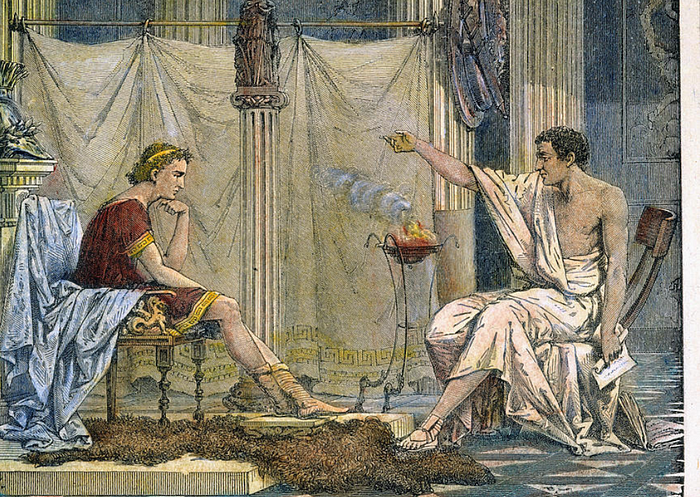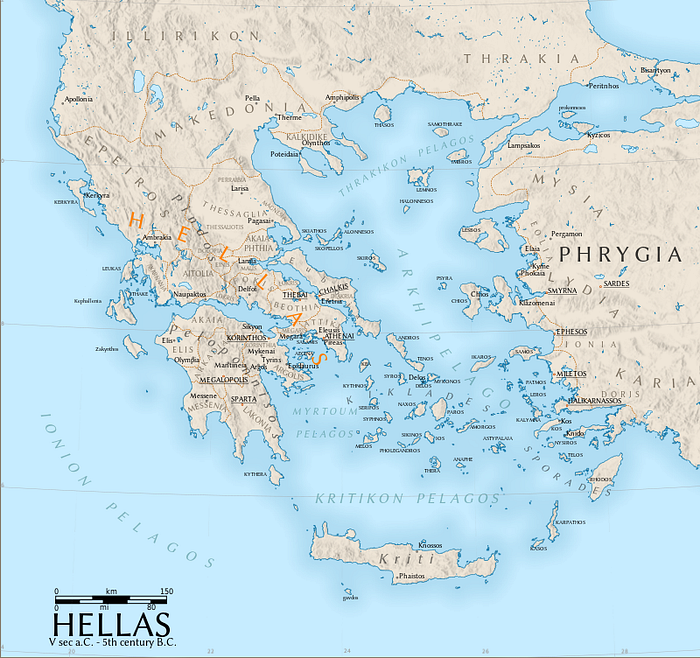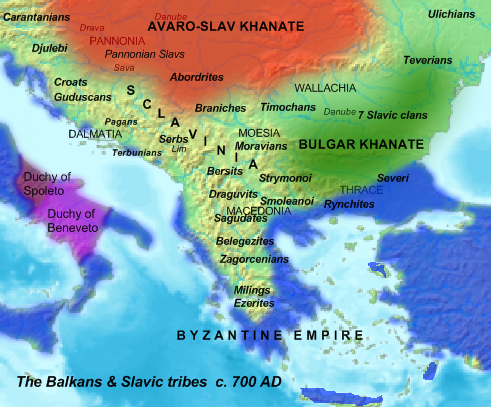Was Alexander The Great Greek?
Who really was Alexander The Great?

Alexander the Great, also known in Greek as Αλέξανδρος ὁ Μέγας, was the king of Ancient Macedonia from 332 BC- 323 BC. That is at least what most people know about him. But, who really was Alexander, and more importantly, was Alexander The Great Greek?
That is a complicated question. Alexander’s identity has always been debated between scholars and politicians. He has become a national hero for both Greece and North Macedonia, causing problems between them.
To answer whether or not Alexander The Great was Greek, we first need to make a few things clear.
What Does It Even Mean To Be Greek?
First of all, the term “Greek” does not exist in the Greek language. “Greek” is a word of Latin origin used by the Romans to distinguish the people of what they called Graecia. Greeks refer to themselves as Hellenes or Έλληνες. The country is also not referred to as Greece, but Hellas, or Ελλάς.
Now that we got that out of the way, what do we mean by Greek? Well, we must understand that people did not always identify with being part of a nation. Nations are a relatively new phenomenon in history.
The idea of nations, along with the rise of nationalism, arose during the 18th century. Before that, people mostly identified with their clans, states, cities, or empires. The Ancient Greeks were no exception to this.
Ancient Greece, as a nation, never existed. In this period, Greeks were separated and identified within their city-states. The only thing that united the Greeks was a common language and religion. However, there is evidence that the Greeks did distinguish themselves from other ethnic groups.

The term “barbarian” is a Greek word that refers to anyone who did not speak Greek. The Hellenes agreed that although every city-state was indeed different, being a Hellene made you superior to the barbarians.
Who Were The Ancient Macedonians?
The Ancient Greeks were a group of different tribes and civilizations that blended into one. The Myceneans were the first Greeks since they spoke the earliest form of the language.
The Myceneans would eventually conquer and mix with the Minoans, who resided on the island of Crete. The Macedonians were an ancient tribe of people who were closely related to the Greeks. They lived in what is now Northern Greece and North Macedonia.
They spoke ancient Macedonian, which was similar to the Greek spoken in Athens and Sparta. They also believed in the same pagan gods. Alexander himself claimed to be the son of Zeus. The term Μακεδόνες even has Greek origins. It most likely comes from the Ancient Greek word Μακεδνός which means tall or slim. Most Greeks today are familiar with its similar term μακρός, which means tall or long.
The controversy begins when historians point out that the Macedonians were considered semi-barbarian other Greeks. We know that Hellenes forbade barbarians from competing in the Olympic games. The Greeks did indeed refer to the Macedonians as barbarians at the time. However, there were instances where Macedonians had participated in the Olympics.
For example, Alexander I of Macedon, who reigned from 489–454 BC, participated in the games. However, he first had to prove his Greek ancestry to the courts. They would eventually agree with his claim and allow him to compete.
A Brief History Of Slavic Migration in The Balkans

We can trace the rivalry between the Greeks and their northern neighbors back to Byzantium. The Byzantine Empire was the eastern half of the Roman empire, which survived 1,000 years after western Rome fell.
The empire consisted of mainly Greeks, and many Armenians, Slavs, Bulgarians, Albanians, and Serbians. Originally, all people under the Eastern Roman Empire were considered Romans. Byzantine is a historical term used by scholars to differentiate the medieval Eastern Roman Empire from its classical predecessor.
National or ethnic identity wasn’t a thing in the Eastern Roman Empire. Even the term Hellene was not acceptable at the time since it was associated with paganism. Paganism was a big no-no for Christians during the middle ages. However, the Byzantines did study the writings of Ancient Greece.
The Slavs had a complicated relationship with the Eastern Romans. Historians agree that Slavic tribes migrated into the Balkans during the 6th and 7th centuries.
There was even conquest of Slavic tribes into mainland Greece at one point during the empire’s history. Some Slavic tribes ended up assimilating into the Byzantine empire. Yet, the majority of Slavs were eventually removed by the Byzantines and pushed north.
Furthermore, the dynasties of the Byzantine Empire started to evolve. From the start, Byzantium had many non-Greek emperors. Justinian, for example, was not of Greek origin. However, this began to change in the latter years of the empire as more dynasties became predominantly Greek until the fall of Constantinople.
Slowly, the old Hellenic identity started to arise again; the fighting between the Greeks and their northern neighbors intensified. Constant wars within the empire, along with the devastating consequences of the crusades would weaken Byzantium. Eventually, the Ottomans defeated the Eastern Romans and took Constantinople in 1453.
North Macedonia Controversy
The nation of what is now called North Macedonia was once part of Yugoslavia. It gained its independence in 1991. In 1993 the nation adopted the name Macedonia, immediately provoking its neighbor, Greece.
To make a long story short, the Greeks claim the name Macedonia as their own. Greece has different states, much like in America. These states have the same names as their ancient counterparts, one of them being Macedonia.
The Greek state of Macedonia encompasses the city where Alexander The Great was born, Pella. However, North Macedonia is also part of where the Ancient Macedonian empire used to rule. The Northern Macedonian perspective is that, even though they have Slavic origins, their people mixed with the native population when they migrated there hundreds of years ago.
Therefore, they used the name “Macedonia” and Alexander himself to create a sense of nationalism. I am not here to say whether this is right or wrong, it’s just that the backstory is necessary to understand the confusion between Alexander’s origins today.
From Greece’s point of view, they see it as a threat to their culture and national identity. Greek nationalism is rooted in its struggle for liberation against 400 years of Ottoman rule.
Furthermore, the modern state of Macedonia (present-day Greece) was under siege during the Bulkan wars. The Greeks may be reacting negatively due to their past struggles to against foreign invaders.
What would Alexander himself think about this?
So, what would Alexander The Great himself think about all this?

Let’s say I go back in time right now and ask Alexander, “Are You Greek?” What would he say? What do you think his reaction would be? Chances are, he would say yes.
You see, Alexander was born a native Greek speaker. The Greek philosopher Aristotle tutored Alexander when he was a boy. Alexander grew up reading the Illiad and Odyssey. He believed that he was the son of Zeus. Learning that the Persians burned down Greek temples during their invasion of Greece in 480 BC angered him.
The name Αλέξανδρος is a combination of the Greek words ἀλέξειν (to protect) and (ἀνδρός), meaning men. The name literally means the protector of men.
By all accounts, Alexander saw himself as a Hellene. But to be a Hellene meant that you were a pagan. That is the problem with taking historical figures from ancient antiquity and representing them through a particular nation or race today.
It is like saying that King Tutankhamun is an Egyptian, which is true. However, if King Tut were to see Egypt today, there would almost be nothing he could relate to. Since King Tut’s time, Egypt has been conquered and ruled by the Persians, Greeks, Arabs, and Turks. All of which have influenced Egyptian culture, demographics, and language.
Most Egyptians today follow Islam and speak Arabic, neither of which were around in Ancient Egypt. Likewise, Julius Caesar was born in what is now modern-day Italy. Does that make him Italian by today’s standards? Caesar identified himself as a Roman. He spoke Latin, which is a different language from Italian.
After Rome fell, the Germanic tribes invaded and occupied the north while the Byzantines were more present in the south. Even to this day, northern Italians feel more German. While southern Italians feel and look more Greek.
The modern Italian identity arose during the middle ages, evolving through the renaissance and eventually into the 18th and 19th centuries. The Italian identity has changed a lot since Caesar’s time.
Alexander’s Obsession With Culture
Let us not forget that Alexander was a big advocate of miscegenation. He obsessed over the idea of mixing Greek culture and genes with the people’s of Asia. Repulsed by his actions, Alexander became unpopular with many of his contemporaries.
Alexander even forced some of his generals to marry Persian women. He started to embrace Persian culture and religion. Alexander even had a Persian wife, Roxana, with who he had a child.
What would he think of the modern concept of race? The idea of a pure-blooded race like the Macedonians not being able to breed with other races. I guess that he would think the idea to be ridiculous.
Alexander’s craze gave birth to the fusion of Greek ideas and culture to the east. Some of these cultural exchanges even lead to the depiction of the Buddha statue in Asia. Let’s stop acting like Alexander was something that he wasn’t.
Alexander was in many ways ahead of his time. He advocated the benefits of racial mixing. He understood that the collision between two magnificent cultures like Persia and Greece would give birth to something even greater than him.
Alexander and Modern Greece
Similar to King Tut and Caesar, Alexander was a pagan. His religious beliefs would not be accepted by the Eastern Orthodox church today. To make matters worse, Alexander claimed to be the son of Zeus.
Could you imagine if he tried to say he was the real Jesus? There would be riots on the streets! Alexander was alive 2,300 years ago. Greece and the Greek identity has changed considerably since then.
To Alexander, what being Greek meant to him back then no longer applies today. He would find the traditions and customs of the Modern Greeks to be strange. He would also have a hard time understanding us, considering that the Greek language has changed a lot in the past 2,300 years.
Even the food we eat would be barely recognizable. Gyros and tzatziki sauce were not around in Alexander’s time.
However, what if Alexander does find solace in modern-day Greece if he were to come back from the dead? After all, the New Testament was written in Koine Greek, a dialect very close to his native tongue. He could very likely convert to Christianity and feel closer to modern Greek identity.
Ironically, his conquests were responsible for allowing this to happen. It was he who conquered the areas of modern-day Isreal and Hellenized it. Alexander also influenced the Greek language by making it a lingua franca of its time.
The Greek language would evolve into Koine Greek or common Greek, which is even more similar to Modern Greek.
Furthermore, his conquests annexed much of Anatolia from the Persians. That would set the stage for the later Byzantine empire and its eventual fall to the Turks in 1453.
Conclusion
To conclude, whether Alexander is Greek or not in the modern-day context is irrelevant. National identity is complicated, especially when referring to someone who lived over 2,000 years ago. No one nation can claim this man for themselves since he lived in a time when nations didn’t exist.
We know that the Ancient Greeks were descendants of the Mycenaeans. The Cretians were at one point part of the Minoan civilization. They eventually started seeing themselves as one people. I think it would be a little silly to say that Alexander and the Macedonians weren’t Greek since they clearly had many cultural and linguistic connections to the Hellenes.
Similarly, the Romans saw themselves as successors to the Etruscans. Eventually, they would mix with people from all over Europe and create a new identity. Alexander did not let his ethnicity hold him back. That is made evident through his relationships with Persian women and his obsession with cultural mixing.
What is relevant, however, is that Alexanders’ presence shaped the identity of Modern Greece.
It’s not a matter of asking whether Alexander was Greek or not in a modern context, but understanding that he made the Greeks who they are today. Without Alexander, Greek would not have become a Lingua Franca. The Greek language today would look very different.
Without Alexander, perhaps the Romans never conquer Greece. Perhaps Buddhism doesn’t spread as much had Alexander not have reached the borders of India. Without Alexander, maybe Christianity never spreads to Europe. That would drastically change not just the history of Greece but the entire continent. Much of Modern Greek culture can be traced back to Ancient Greece, but also mainly from Byzantium.
If you take Alexander out of the picture, there would be no Byzantium. If Byzantium never existed, neither modern Greece nor North Macedonia would have the same identity today.
Modern Greece is definitely a descendant of the legacy that Alexander the Great left behind. But then again, you could say the same for the rest of the world as well.
